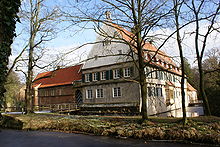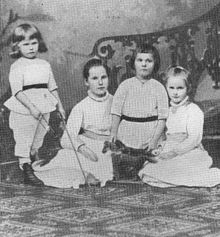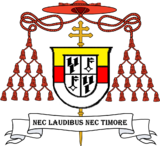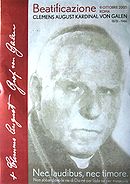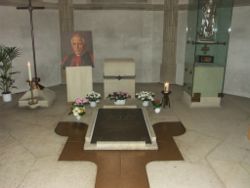- Clemens August Graf von Galen
-
Blessed Bishop Clemens August Graf von Galen 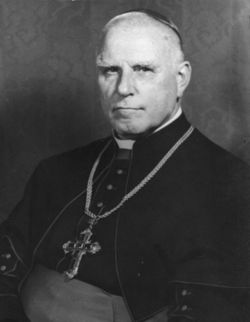
"Lion of Münster"Born March 16, 1878
Dinklage Castle, GermanyDied March 22, 1946 (aged 68)
Münster, GermanyBeatified 9 October 2005 by Pope Benedict XVI Feast 22 March Blessed Clemens August Graf von Galen (March 16, 1878 – March 22, 1946) was a German count, Bishop of Münster, and Cardinal of the Roman Catholic Church. He received part of his education in Austria from the Jesuits at the Stella Matutina in the border town of Feldkirch, on the Austrian border with Switzerland and Liechtenstein. After his ordination he worked in Berlin at Saint Matthias, where he became a close friend of Nuncio Eugenio Pacelli, later to be Pope Pius XII. An outspoken critic of certain Nazi policies, he issued forceful, public denunciations of the Third Reich's euthanasia programs and persecution of the Catholic Church - yet he remained silent on the equally important issues of roundups, deportations, and mass murder of Jews. [1] He was a nationalist, - when the Second World War broke out following the attack on Poland, "he rallied to the flag and called upon all Germans to do their duty for the Fatherland" [2] - he disliked intensely the liberal values of the Weimar Republic and was against individualism, socialism, and democracy. He believed he could not fully support the Weimar Republic because of its democratic basis, yet he believed he owed obedience to the Nazi state, even taking the oath of loyalty to it as a bishop.[3]
Contents
Early years
Clemens August von Galen belonged to one of the oldest of the most distinguished noble families of Westphalia,[4] and was born in the Catholic southern part of the Duchy of Oldenburg (Oldenburger Münsterland, near the German border with the Netherlands), on the Burg Dinklage, now in the state of Lower Saxony. The von Galen name had long been associated with the region; the von Galens had been there since 1667, when Christoph Bernhard von Galen was named first bishop of Münster after putting down the Anabaptists, "leaving the bodies of the heretics to rot in cages lining the city's gates." [5] Clemens August was the son of Count Ferdinand Heribert von Galen, a member of the Imperial German parliament (Reichstag) for the Catholic Centre Party, and Elisabeth von Spee, [6] the eleventh of thirteen children.
Until 1890 Clemens August and his brother Franz were tutored at home. He received his main schooling at a Jesuit School, Stella Matutina in the Vorarlberg, Austria, where only Latin was allowed to be spoken. Jesuits were not permitted in Münster at this time, evidenvce of the lasting impact of the Kulturkampf, so Clemens had to leave his family and state to receive this Jesuit education. He was not an easy student to teach, and his Jesuit superior wrote to his parents: “Infallibility is the main problem with Clemens, who under no circumstance will admit that he may be wrong. It is always his teachers and educators who are wrong.[7]
Because Prussia did not recognize the Stella Matutina academy, Clemens spent the last years of his education near home. In 1894 he returned home to attend a public school in Vechta and by 1896 both Clemens and Franz had passed the examinations that qualified them to attend a university. Upon graduation, his fellow students wrote in his yearbook: "Clemens doesn't make love or go drinking, he does not like worldly deceit." By 1896 he went to Switzerland to study at the Catholic University of Freiburg, which had been established in 1886 by the Dominicans, where he encountered the writings of Thomas Aquinas. In 1897 he began to study a variety of topics, including literature, history, and philosophy. Following the first winter semester at Freiburg, Clemens and Fritz went on an extended visit to Rome, for three months. At the end of the visit he told Fritz that he had decided to become a priest though he was unsure whether to become a contemplative Benedictine, or a Jesuit. [8] In 1899 he met Pope Leo XIII in a private audience. He studied at the Theological Faculty and Convent in Innsbruck, founded in 1669 by the Jesuits, where scholastic philosophy was emphasized, and new concepts and ideas avoided. In 1903 von Galen left Innsbruck to enter the seminary in Münster, and he was ordained a priest on May 28 1904. At first he worked for a family member, the Auxiliary Bishop of Münster, as Chaplain.[9]
Soon he moved to Berlin, where he worked as parish priest at St. Matthias.[10]
In Berlin (1906-1929)
Von Galen arrived in Berlin on April 23, 1906 and stayed until April 16, 1929 - the longest time he spent in any one place. Germany's capital contained districts of Protestant elites, a Catholic community composed of primarily working class people and a Jewish community of both middle-class and poorer immigrants. It was a booming commercial and cultural metropolis at the time von Galen arrived - its population increased from 900000 in 1871 to slightly less than 4 million by 1920. Religion did not bring the community together - "religion and fears of a loss of religious belief came to be a major source of internal division."[11] For the working class, Catholicism and Social Democracy competed for allegiance. In this atmosphere von Galen sought to be an energetic and idealistic leader of his parish - he made visits to the sick and poor, became president of the Catholic Young Mens Association, gave religious instruction in the schools , and for his efforts he was named Papa Galen by the parishioners he served.
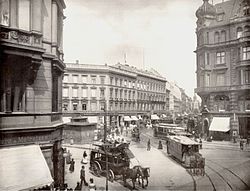 The Berlin Years (1906-1929)- "the problem most frequently voiced by Catholics in Berlin at the time was that of maintaining Catholic identity in an environment dominated by Protestants and Social Democracy. By maintaining a wide range of facilities - hospitals, orphanages, and hostels - Catholics thought of themselves as a socially cohesive group despite the diversity of the city - a Catholic sub-culture in which clergymen were generally recognised as leaders." [12]Photo: Berlin street, circa 1900
The Berlin Years (1906-1929)- "the problem most frequently voiced by Catholics in Berlin at the time was that of maintaining Catholic identity in an environment dominated by Protestants and Social Democracy. By maintaining a wide range of facilities - hospitals, orphanages, and hostels - Catholics thought of themselves as a socially cohesive group despite the diversity of the city - a Catholic sub-culture in which clergymen were generally recognised as leaders." [12]Photo: Berlin street, circa 1900
In the First World War Von Galen's position was that he wished to serve, and volunteered to serve, in order to demonstrate his loyalty to the Kaiser. As parish priest, he encouraged his parishioners to serve their country willingly. In August 1917 he made a visit to the front lines in France and was uplifted by the optimistic disposition of the troops. "Feelings of German nationalism, apparently, could triumph over concern for the violations of the sanctity of human life in war." [13] In 1916 and 1917 he reacted to reports concerning the German military's planned colonization of Eastern Europe by welcoming the plan of occupation and stating that German Catholics should be moved into the area, especially in Lithuania; his goal not being to expel the Letts, but rather to educate them to think and feel as Germans. [14] Following the German surrender in November 1918 von Galen, stil in Berlin, dreaded the loss of the monarchy and feared the poor would embrace radicalism and anarchy. To deal with immediate problems of hunger and poverty he worked to create soup kitchens, aid societies, and clothing drives. He was suspicious of the new Weimar democracy and believed "the revolutionary ideas of 1918 had caused considerable damage to Catholic Christianity."[15] Throughout the Weimar years he remained on the right of German politics. He often criticized the Catholic Centre Party for being too left-wing. He believed the Dolchstosslegende explained the German Army's defeat in 1918- that Germany had been destroyed by defeatist elements on the home front. He deplored the disappearance of the monarchy. [16]
Bishop of Münster
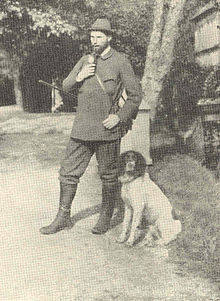 Clemens August von Galen in 1899 after a hunt. " a commanding presence [6ft 7inches tall]- his rooms were furnished simply, he wore unpretentious clothing, and he spoke plainly- he did not like the theatre, secular music (except for military marches), or literature. His only reported vice, which he refused to give up, was smoking his pipes. [17]
Clemens August von Galen in 1899 after a hunt. " a commanding presence [6ft 7inches tall]- his rooms were furnished simply, he wore unpretentious clothing, and he spoke plainly- he did not like the theatre, secular music (except for military marches), or literature. His only reported vice, which he refused to give up, was smoking his pipes. [17]
Von Galen was elected bishop of Münster in the critical year for Germany of 1933. Documents in the Vatican Archives, which opened related information in 2003, indicate that von Galen was elected only after other candidates had turned down the offer, and in spite of a protest from Nuncio Orsenigo to Cardinal Eugenio Pacelli, who expressed his opinion that von Galen was bossy and paternalistic in his public utterances.[18]
Once elected, von Galen campaigned against the totalitarian approach of the Nazi Party in national education, appealing to parents to insist on Catholic teaching in schools. He successfully used the recently agreed-upon Reichskonkordat (§ 21, granting the Church the right to determine its own religious instruction) to force the National Socialists to permit continued Catholic instruction in Catholic schools. It was one of the first instances where the Reichskonkordat was used by the Church as a legal instrument opposing the government, which was one of the intentions of Pope Pius XI.[19]
Shortly thereafter, von Galen began to attack the racial ideologies of the new regime, partly poking fun at it, partly critiquing its ideological basis as published by Alfred Rosenberg. He declared it as unacceptable to refuse the Old Testament because of its Jewish authorship, and to limit morality and virtue to the perceived usefulness of a particular race.[20]
Protests against Nazi crimes
In 1941 von Galen gave a string of sermons protesting against Nazi policies on euthanasia, Gestapo terror, forced sterilization and concentration camps.[21] His attacks on the Nazis were so severe that Nazi official Walter Tiessler proposed in a letter to Martin Bormann that the Bishop be executed.[22]
On July 13, 1941, von Galen publicly attacked the regime for its Gestapo tactics of terror, including disappearances without trial, the closing of Catholic institutions without any stated justifications, and the resultant fear imposed on all Germans throughout the nation. The powerful Gestapo, he argued, reduced everybody, even the most decent and loyal citizens, to being afraid of ending up in a basement prison or a concentration camp. As the country was at war, von Galen rejected the notion that his speech undermined German solidarity or unity. Using the lines of his friend Eugenio Cardinal Pacelli, as written in Opus Justitiae Pax and Justitia fundamentum Regnorum, von Galen noted that "Peace is the work of Justice and Justice, the basis for dominion," then attacked the Third Reich for undermining justice, the belief in justice and for reducing the German people to a state of permanent fear, even cowardice. He concluded: As a German, as a decent citizen I demand Justice.[23]
In a second sermon on July 20, 1941, von Galen informed the faithful that all written protests against Nazi hostilities had proved to be useless. The confiscation of religious institutions continued unabated. Members of religious orders were still being deported or jailed. He asked his listeners to be patient and to endure, and that the German people were being destroyed not by the Allied bombing from the outside, but from negative forces within.[24]
On August 3, 1941, von Galen informed his listeners in a third sermon about the continued desecration of Catholic churches, the closing of convents and monasteries, and the deportation and euthanasia of mentally ill people (who were sent to undisclosed destinations), while a notice was sent to family members stating that the person in question had died. This is murder, he exclaimed, unlawful by divine and German law, a rejection of the laws of God. He informed them that he had forwarded his evidence to the State Attorney. "These are people, our brothers and sisters; maybe their life is unproductive, but productivity is not a justification for killing." If that were indeed a justification for execution, he reasoned, everybody would have to be afraid to even go to a doctor for fear of what might be discovered. The social fabric would be affected. Von Galen then remarked that a regime which can do away with the Fifth Commandment (thou shalt not kill) can destroy the other commandments as well.[25]
The sermons were reproduced and sent all over Germany to families, and to German soldiers on the Western and Eastern Fronts. Karol Wojtyla is said to have read a copy in Krakow (it is unclear whether he read a copy while already a member of the Polish Resistance, or whether the sermon itself influenced his decision to join).[citation needed] The resulting local protests in Germany broke the secrecy which had hitherto surrounded the euthanasia program Aktion T4.[26] The local Nazi Gauleiter was furious and demanded the immediate arrest of von Galen. However, Joseph Goebbels, Bormann and others preferred to wait until the end of World War II, to avoid undermining German morale in a heavily Catholic area.[27] Of von Galen's remarks, perhaps the most effective was his question asking whether permanently injured German soldiers would fall under the programme as well. A year later, the euthanasia program was still active, but the regime was conducting it in greater secrecy.
According to Robert Jay Lifton, "[t]his powerful, populist sermon was immediately reproduced and distributed throughout Germany — indeed, it was dropped among German troops by British Royal Air Force flyers. Galen's sermon probably had a greater impact than any other one statement in consolidating anti-‘euthanasia' sentiment."[28]
German patriot
Von Galen openly supported the Protestant Paul von Hindenburg against the Catholic candidate Wilhelm Marx in the presidential elections of 1925. He was known to be a German patriot and a fierce anti-Communist who favoured the battle on the Eastern Front against Joseph Stalin's regime in the Soviet Union. His views on communism were largely formed as a consequence of the Stalinization and relentless persecution of Christians within the Soviet Union since 1918, during which virtually all Catholic bishops were either killed or forced underground. He welcomed the 1941 German war against the USSR as a positive development[29]
A sermon the Bishop gave in 1941 served as the inspiration for the anti-Nazi group The White Rose, and the sermon itself was the group's first pamphlet.[30]
Generalmajor Hans Oster, a devout Lutheran and leading member of the German Resistance, once said of Bishop von Galen:
He's a man of courage and conviction. And what resolution in his sermons! There should be a handful of such people in all our churches, and at least two handfuls in the Wehrmacht. If there were, Germany would look quite different![31]
The published sermons of Von Galen show that he condemned the racist deportations of the Nazis. Von Galen, further, suffered virtual house arrest from 1941 until the end of the war.
After the war, his indignation turned on the British occupiers, who, in his view, complicated by hostile acts (including starvation rations for the common people) an already difficult life in post-war Germany. The British responded by taking away his car and thus preventing him from visiting parishes and carrying out planned confirmations. On April 13, Galen went to American authorities to protest against Russian soldiers' raping of German women, and against American and British forces' plundering of German homes, factories, and offices, especially at night.[32] On July 1, 1945, he denounced "the ransacking of our homes[, already] destroyed by bombs", "the pillaging and destruction of our houses and farms in the countryside by armed bands of robbers", the "murder of defenceless men", "the rape of German women and girls by bestial lechers" (it was estimated that 2 million German women were raped, with a ten percent death rate mainly from suicide; women of other nationalities were raped, too),[33] and the indifference of the occupying authorities to the risk of famine in Germany: all these horrors finding justification on the basis of "the false view that all Germans are criminals and deserve the most severe punishment, including death and extermination!".
In a joint interview with British officials, Von Galen told the international press that, "just as I fought against Nazi injustices, I will fight any injustice, no matter where it comes from".[34] He repeated these claims in a sermon on July 1, 1945, which, as in the Nazi years, was secretly copied and distributed throughout occupied Germany. The British authorities felt attacked by Von Galen's sermon and ordered him to renounce it immediately; he refused.[35] His rising popularity may have contributed to their decision to subsequently allow him free speech without any censorship. In an interview with Swiss media, Von Galen demanded just punishment for real Nazi criminals but humane treatment for the millions of German prisoners of war who had not committed any crimes but were prohibited by the British from any contact with their relatives. He criticized British dismissal of Germans from public service without investigation and trial, noting that the Nazis had done the same in 1933, but that the Nazi victims had at least continued to receive pensions.[36] He forcefully condemned the expulsion of German civilians from former German provinces and territories in the east annexed by communist Poland and the Soviet Union.
SS-General Kurt Meyer, accused of complicity in the shooting of 18 Canadian prisoners of war (POWs), was sentenced to death. Galen intervened at the request of the family.[37] On second review, a Canadian general, finding only "a mass of circumstantial evidence", commuted his death sentence. Meyer served nine years in British and Canadian POW prisons. The British forces tried to get support by inviting Dr. Bell, the Anglican Bishop of Chichester, to meet Von Galen for a three way-meeting in October 1945. Bell adjudged Von Galen as possessing enormous moral power, a passion for justice, and well-educated behaviour, and as being very concerned for his people and a defender of ecumenical cooperation.[38]
College of Cardinals
Unexpectedly, at Christmas 1945 it became known that Pope Pius XII would appoint three new German cardinals, one of them Bishop von Galen, who, despite numerous British obstacles and denial of air travel, arrived in Rome February 5, 1946.[39] Generous American cardinals financed his Roman stay, as German money was not in demand. He had become famous and popular, so after the pope had placed the red hat on his head with the words: 'God bless you, God bless Germany,' Saint Peter's basilica for minutes thundered in a "triumphant applause" for von Galen,[40] He interpreted it as "a sign of the love of the Pope for our poor German people. Before all the world he has, as a supranational and impartial observer, recognized the German people as equal in the society of nations". While in Rome, he visited the German POW camps in Taranto and told the German Wehrmacht soldiers that he would take care of their release, and that the Pope himself was working on the release of POWs. He took a large number of comforting personal messages to their worried families.[41]
After receiving the red hat from Pope Pius XII, von Galen went to see Madre Pascalina, the faithful servant of the Pope. He told her how the Pope had quoted long passages from his 1941 sermons from memory and how he thanked him for his courage. Galen told the Pope, “Yes, Holy Father, but many of my very best priests died in concentration camps, because they distributed my sermons”. Pius replied that he was always aware that thousands of innocent persons would have been sent to certain death if he as pope had protested. They talked about the old days in Berlin, and von Galen declared: "for nothing in the world would I want to have missed those two hours, not even for the red hat."[42]
Death and beatification
Following his return from the wearisome travel to Vatican City, the new cardinal was celebrated enthusiastically in his native Westphalia and in his destroyed city of Münster, which still lay completely in ruins as a result of the air raids. He died a few days after his return from Rome in the St. Franziskus Hospital of Münster due to an appendix infection diagnosed too late. His last words were:[43] "Yes, Yes, as God wills it. May God reward you for it. May God protect the dear fatherland. Go on working for him... oh, you dear Saviour!" He was buried in the family crypt of the Galen family in the destroyed Cathedral of Münster.
The cause for beatification was requested by his successor, Bishop Michael Keller of Münster and began under Pope Pius XII in 1956. It was concluded positively in November 2004 under Pope John Paul II. Clemens August Graf von Galen was beatified on October 9, 2005 outside St. Peter's Basilica by Pope Benedict XVI, the 47th anniversary of the death of Pope Pius (1958).
Clemens August Graf von Galen ancestors16. Wilhelm Ferdinand von Galen
(1690-1769)8. Clemens August Johann Joseph Nepomuk Maria von Galen
(1748-1820)17. Sophie von Merveldt
(1730-1810)4. Graf Matthias von Galen
(1800-1880)18. Johann Mathias Kaspar Friedrich Joseph von Ascheberg
(1737-1818)9. Anna Angela Caroline von Ascheberg
(1773-1806)19. Maria Franziska Carolina Josepha Ferdinanda von Etzbach
(1744-1821)2. Ferdinand Heribert Ludwig von Galen
(1831-1906)20. Clemens August Antonius Ignatz von Ketteler
(1751-1815)10. Maximilian Friedrich Ludwig Alexander Clemens Joseph Maria Anton von Ketteler
(1779-1832)21. Maria Anna Alexandrina von Galen
(1752-1829)5. Freiin Anna Maria von Ketteler
(1803-1884)22. Clemens August Franz Xaver Stephan von der Wenge zu Beck
(1740-1818)11. Klementine von der Wenge zu Beck
(1778-1844)23. Maria Ludovika Wilheklmine von Eynatten
(1748-1803)1. Clemens August Joseph von Galen
(1878-1946)24. Graf Carl Wilhelm Franz Xaver Adam von Spee
(1758-1810)12. Graf Franz Ambrosius Joseph Anton Adam von Spee
(1781-1859)25. Anna Elisabeth Augusta von Hompesch-Bollheim
(1763-1785)6. Wilhelm Constantin Hubert von Spee
(1813-1882)26. Ferdinand-August von Merveldt
(1759-1834)13. Gräfin Sophie Maria von Merveldt
(1786-1848)27. Gräfin Theresia von Pergen
(1763-1802)3. Elisabeth von Spee
(1842-1920)28. Aloys Friedrich Joseph von Brühl
(1739-1793)14. Graf Friedrich August von Brühl
(1791-1856)29. Josepha Christina Amalie Schaffgotsch genannt Semperfrei von und zu Kynast und Greiffenstein
(1764-1846)7. Franziska von Brühl
(1818-1844)30. Franz Joseph von Sternberg-Manderscheid
(1763-1830)15. Auguste von Sternberg-Manderscheid
(1793-1820)31. Maria Franziska von Schönborn-Heussenstamm
(1763-1825)Terminology note
- Regarding personal names, Graf is a German title, translated as Count, not a first or middle name. The feminine form is Gräfin.
References
- ^ Griech-Polelle, p.22
- ^ Helmreich, The German Churches under Hitler, 347
- ^ Portmann, Cardinal von Galen, 53-54, cited in Griech-Polelle, p.20
- ^ Von Galen Family
- ^ Bishop vn Galen, Beth A.Griech-Polelle, p.9
- ^ Heinrich Portmann, Kardinal von Galen Aschendorff, Münster, Westfalen, 1948 9-35
- ^ Maria Anna Zumholz, Die Tradition meines Hauses. Zur Prägung Clemens August Graf von Galens in Elternhaus, Schule und Universität. In Joachim Kuropka (Hrsg.): Neue Forschungen zum Leben und Wirken des Bischofs von Münster. Regensberg, Münster 1992, S. 18, ISBN 3-7923-0636-0.
- ^ Griech-Polelle, p.14
- ^ Gottfried Hasenkamp: Der Kardinal – Taten und Tage des Bischofs von Münster Clemens August Graf von Galen. Aschendorff, Münster, 2. Aufl. 1985, ISBN 3-402-05126-5, S. 9 f.
- ^ In Joachim Kuropka (Hrsg.): Neue Forschungen zum Leben und Wirken des Bischofs von Münster. Regensberg, Münster 1992, S. 32 f. ISBN 3-7923-0636-0
- ^ Smith, German Nationalism and Religious Conflict, cited by Griech-Polelle, p.16 Smith argues that anti-Semitism coexisted with confessional antagonisms between Catholics and Protestants.
- ^ Griech-Polelle, p.17
- ^ Griech-Polelle, p.18
- ^ Griech-Polelle, p.18
- ^ Portmann, 66
- ^ Griech-Polelle, p.20
- ^ Griech-Polelle, p17
- ^ Ludger Grevelhörster: Kardinal Clemens August Graf von Galen in seiner Zeit. Aschendorff, Münster 2005, ISBN 3-402-03506-5, S. 57
- ^ Löffler (Hrsg.): Bischof Clemens August Graf von Galen – Akten, Briefe und Predigten 1933–1946. Ferdinand Schöningh, Paderborn/München/Wien/Zürich, 2. Aufl. 1996, S. 46 f. ISBN 3-506-79840-5; vgl. auch Rudolf Willenborg: „Katholische Eltern, das müßt ihr wissen!“ – Der Kampf des Bischofs Clemens August Graf von Galen gegen den totalen Erziehungsanspruch des Nationalsozialismus. Wirkungen auf Partei und Staat unter besonderer Berücksichtigung des oldenburgischen Teils der Diözese Münster. In Joachim Kuropka (Hrsg.): Neue Forschungen zum Leben und Wirken des Bischofs von Münster. Regensberg, Münster 1992, S. 101, 102 f. ISBN 3-7923-0636-0
- ^ Rudolf Morsey, Clemens August Kardinal von Galen – Bischöfliches Wirken in der Zeit der Hitler-Herrschaft. Landeszentrale für politische Bildung, Düsseldorf 1987, S. 14
- ^ Allen, John L., Cardinal Ratzinger, p. 26, Continuum International Publishingh 2000
- ^ Allen, John L., Cardinal Ratzinger, p. 26, Continuum International Publishingh 2000
- ^ Peter Löffler (Hrsg.): Bischof Clemens August Graf von Galen – Akten, Briefe und Predigten 1933–1946. Ferdinand Schöningh, Paderborn/München/Wien/Zürich, 2. Aufl. 1996, S. 843 ff. ISBN 3-506-79840-5
- ^ Peter Löffler (Hrsg.): Bischof Clemens August Graf von Galen – Akten, Briefe und Predigten 1933–1946. Ferdinand Schöningh, Paderborn/München/Wien/Zürich, 2. Aufl. 1996, S. 855 ff. ISBN 3-506-79840-5
- ^ Peter Löffler (Hrsg.): Bischof Clemens August Graf von Galen – Akten, Briefe und Predigten 1933–1946. Ferdinand Schöningh, Paderborn/München/Wien/Zürich, 2. Aufl. 1996, S. 874 ff. ISBN 3-506-79840-5
- ^ Winfried Süß: Bischof von Galen und die nationalsozialistische „Euthanasie“. In: zur debatte 2005, S. 18 f. Onlineausgabe
- ^ Joachim Kuropka: Clemens August Graf von Galen (1878–1946) – Ein großer Niedersachse. Begleitheft zur Ausstellung im Niedersächsischen Landtag 10. bis 19. Juni 1992, S. 5 f.
- ^ Robert Jay Lifton Medical Killing and the Psychology of Genocide 94
- ^ Peter Löffler (Hrsg.): Bischof Clemens August Graf von Galen – Akten, Briefe und Predigten 1933–1946. Ferdinand Schöningh, Paderborn/München/Wien/Zürich, 2. Aufl. 1996, S. 901, 902 ISBN 3-506-79840-5
- ^ The White Rose Shoah Education Project Web
- ^ Philipp Freiherr von Boeselager, Valkyrie: The Story of the Plot to Kill Hitler, by its Last Member, Vintage Books, 2009. Page 70.
- ^ Portmann 234
- ^ Beevor, Anthony 'They raped every German female from eight to 80', May 1, 2002 The Guardian
- ^ Portmann, p. 237
- ^ Portmann 239
- ^ Portmann 245
- ^ "According to what has been reported to me, General Kurt Meyer was sentenced to death because his subordinates committed crimes he didn't arrange and of which he did not approve. As a proponent of Christian legal opinion, which states that you are only responsible for your own deeds, I support the plea for clemency for General Meyer and pledge for a pardon."
- ^ Portmann 246
- ^ Portmann, pp. 264–265
- ^ Portmann, p. 290
- ^ Portmann 296–297
- ^ Pascalina Lehnert, Ich durfte Ihm dienen, Würzburg, 1988, p.151
- ^ Gottfried Hasenkamp, Heimkehr und Heimgang des Kardinals, a.a.O., S. 13
External links
- Four Sermons of Bishop von Galen from 1941
- Sermon Against Euthanasia
- Sermon Against the Gestapo
- Cardinal Galen at Find A Grave
- Rudolf Morsey: Online-Biografie of Clemens August von Galen on the web-portal Westfälische-Geschichte.de
- Münsterski lav i Pio XII. Documents published in Croatian Catholic weekly newspaper Glas Koncila
Categories:- 1878 births
- 1946 deaths
- German cardinals
- German Roman Catholics
- German nobility
- German Roman Catholic bishops
- German Catholics opposed to the Third Reich
- Cardinals created by Pope Pius XII
- Beatified people
- German anti-communists
- Bishops of Münster
- 20th-century venerated Christians
Wikimedia Foundation. 2010.

